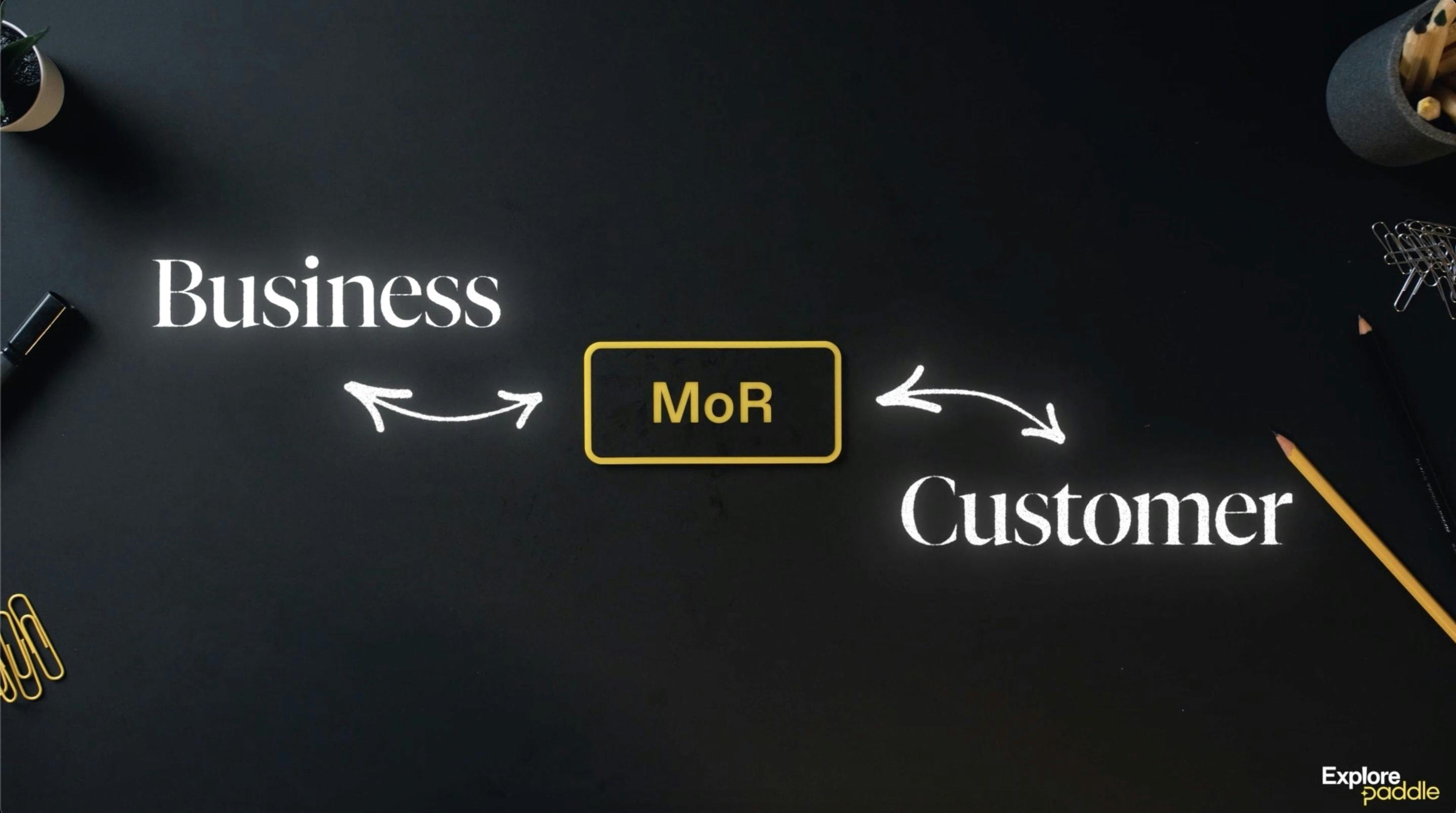A Merchant of Record offers businesses an alternative to building your own payments stack, so you can focus on crafting your product and winning customers, rather than on the mechanics of how you get paid.
The Merchant of Record (MoR) model gives businesses the option to offload operational work. The kind that can easily cost a finance team or growing business a painful amount of resources, like international payments and sales tax compliance. Here, we explain exactly what the MoR model is, how it works, and why so many businesses chose to partner with one.
What is a Merchant of Record?
A Merchant of Record (MoR) is a legal entity responsible for selling goods or services to an end customer. They manage all payments and take on the associated liabilities, such as collecting sales tax, ensuring Payment Card Industry (PCI) compliance, and honoring refunds and chargebacks.
Businesses can choose to be their own MoR, setting up the infrastructure and processes needed to manage payments and liabilities. Alternatively, Merchant of Record service providers exist to take the burden of managing payments and sales tax compliance away from those who would rather focus their in-house resources on growth through product development or customer acquisition.
How does the Merchant of Record model work?
If you choose to sell through a Merchant of Record, your customers still go to your website to access the products. But with the MoR acting as a reseller, there are actually two transactions taking place during the sale: One between the end customer and the MoR, and the other between the MoR and you.
Need a Merchant of Record for your SaaS or digital product? Talk to our team today
When the transaction is complete, it’s the Merchant of Record’s name that appears on the customer’s credit card statement and to whom the cardholder has recourse in case of any dispute, as they are technically making the sale with the end customer. This is how and why the Merchant of Record becomes the liable party.

What types of business benefit from an MoR?
Any business can benefit from outsourcing the hassle of building and maintaining a payments infrastructure and handling sales tax compliance. The Merchant of Record model is particularly useful for companies that sell to cross-state or international customer bases where the company isn’t set up locally. Selling across borders comes with a lot of financial and legal admin. The MoR can free a business from having to worry about any of that. Industries that benefit from this include:
- SaaS: If you sell software as a service then your customer base is global by default – anyone can sign up. Or at least try to. This can make payments, billing, saas sales tax, and compliance complicated fast.
- E-commerce & D2C: A lot of online retailers and direct-to-consumer (D2C) businesses sell across state lines or internationally without having local offices or bank accounts etc.
- Digital products/downloads: Similarly, businesses that sell downloadable items like eBooks, games, or academic papers will attract customers from all over the globe.
- Mobile apps: The App Store and Google Play store act as the MoR for apps sold on those platforms. For mobile apps that also drive app sales outside of the app stores on the web, they can use an MoR.
What does partnering with a Merchant of Record take off your plate?
Wondering if your business should be looking into obtaining an MoR? Here’s a quick overview of some of the issues and responsibilities you'll be outsourcing:
- Merchant accounts: setting up multiple merchant bank accounts in the countries where you have a substantial customer base, to accept payments in additional currencies
- Payment and data compliance: Managing payment card security (PCI-DSS) and upholding relevant data requirements in the locations you sell to, or integrating additional tools to manage this
- Local entity creation: Establishing local business entities to facilitate merchant accounts, tax registration, payment relationships, and so on. Each one can take over two years and cost up to $2M per market to set up.
- Currency conversion: handling the conversion of payments made in foreign currencies by international customers
- Payment failure rates: integrating & maintaining multiple B2B payment processors or payment service providers to facilitate payment routing and cascading, to mitigate the chance of payments being mistakenly declined as fraudulent, causing lost revenue
- Payment processor fees: negotiating and managing all credit and debit card fees
- Fraud offenses: Creating logic to flag fraudulent orders, and then manually reviewing those suspicious orders, refining your custom rules
- Disputes and refunds: handling payment reconciliation, refunds, and chargebacks
- Sales tax: calculating, filing, and remitting software sales tax in the locations where your customers are
Setting up and maintaining the infrastructure and admin needed here in-house can quickly amount to hiring several teams.
What does the MoR model mean for your relationship with customers?
An MoR in a transaction will have certain obligations towards the end buyer, including the responsibility for the calculation and remittance of sales tax. But the transaction itself is where its relationship starts and ends. You remain in control of how you present your product and the ongoing relationship with the customer. You interact with them as normal in terms of product support and marketing, including executing separate terms and conditions that relate to the product use.
Is Paddle a Merchant of Record?
Paddle is a provider of complete recurring billing software for SaaS and digital product businesses, which includes acting as the Merchant of Record for thousands of software companies around the world.
We handle all payments, taxes, currencies, and financial compliance, like other MoRs, but we've built the Paddle platform specifically for SaaS companies and growth strategies.
Need a Merchant of Record for your SaaS or digital product company? Talk to our team today
In addition to the benefits of an MoR, Paddle provides hybrid billing solutions, innovative payment routing, and subscription management software. Our sellers also receive 24/7 support from our Customer Success team and strategic guidance from our experienced revenue delivery advisors – specialists in growing your business globally.
We equip SaaS and digital product companies with the ability to experiment and respond quickly to new growth opportunities across customer acquisition, retention, and expansion, without the administrative and engineering burdens or revenue leaks created by a DIY infrastructure.
Find out more about Paddle or speak directly to an expert by booking a demo here.
Merchant of Record FAQs
What’s the difference between a Merchant of Record and a payment service provider (PSP)
The main difference between an MoR and a PSP is that a Merchant of Record handles your entire order process, which includes taking on the related liabilities, whereas a payment service provider only handles the transaction process – the part where money leaves your customer’s bank account and arrives in yours.
A PSP, like Stripe, doesn’t take on any of the financial or taxation responsibilities of the transactions you make through their gateway. An MoR takes care of all of them. Payment service providers are also only one part of your wider payments infrastructure; you’ll need to manage and integrate other (often costly) tools to build a sufficient billing stack.
What's the difference between a Merchant of Record (MoR) and a seller of record (SoR)?
When comparing Merchant of Record vs seller of record, a MoR like Paddle carries out the role of SoR with the additional benefits of global tax and VAT compliance, as well as managing payments and transactions and the related liabilities. The SoR is usually the business that owns the product or service, and many high-growth businesses use MoRs to focus on improving their products.
Is Stripe a Merchant of Record?
Stripe has released its Managed Payments product, currently in beta which is a Merchant of Record-type feature. It provides some simplification for tax and compliance, but still requires users to manage much of their payment stack. Stripe does operate as the business of record for marketplaces transacting using Stripe Connect, and is considered as a payment service provider, or payment gateway. Read our payfac vs Merchant of Record article to find out more about how they are different.




